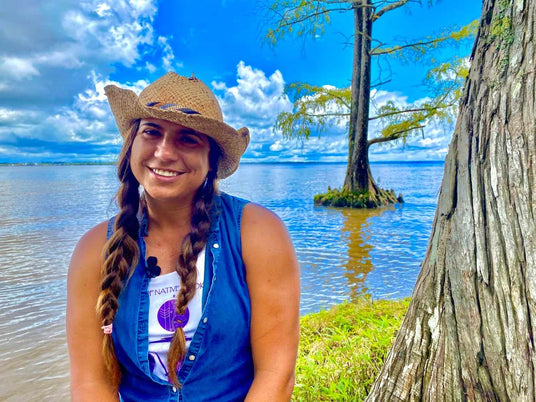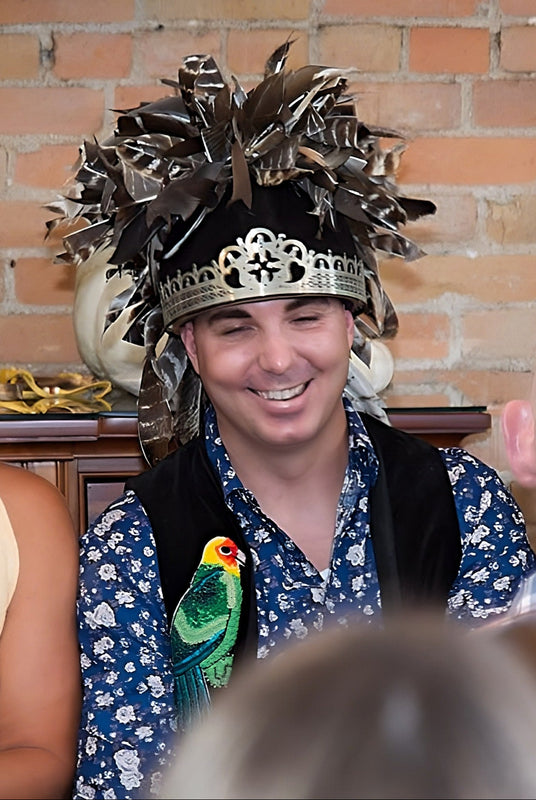Our Team

Beth Roach
Co-Founder
Beth Roach, Vice-Chair of the Nottoway Indian Tribe of Virginia's Tribal Council, is a co-founder of the Alliance of Native Seedkeepers. She leads initiatives to revitalize Indigenous seeds and promote food sovereignty, with projects like the Nottoway Corn Project, which revives traditional corn varieties adapted for today’s climate. Beth also established the Tribal Coastal Resilience Connections Program, now part of the Albemarle-Pamlico National Estuary Partnership, bringing together tribal communities to address climate challenges. As the Sierra Club's National Water Conservation Campaign Manager, Beth advocates for clean water access and environmental justice for Indigenous and marginalized communities.
More About Beth Roach
Beth Roach: Extended Biography
Beth Roach: Extended Biography
Elizabeth “Beth” Roach is a co-founder of the Alliance of Native Seedkeepers, an organization dedicated to the revitalization of ancestral seeds and the restoration of Indigenous food sovereignty. As Vice-Chair of the Nottoway Indian Tribe of Virginia’s Tribal Council and leader of the tribe’s Environmental Protections Committee, Beth has been at the forefront of protecting Indigenous lands, waterways, and cultural practices. She is an accomplished storyteller and historian, using her extensive knowledge to advocate for the revitalization of environmental and cultural heritage. By bridging the wisdom of Indigenous traditions with modern conservation efforts, Beth fosters a sense of resilience deeply rooted in community and ecological stewardship.
Beth serves as the National Water Conservation Campaign Manager for the Sierra Club. In this role, she addresses urgent issues surrounding water quality and environmental equity, ensuring that Indigenous, marginalized, and impoverished communities have access to clean water. Her role combines grassroots organizing with policy advocacy, amplifying the voices of those most impacted by environmental challenges. Beth previously served as the National Director of the Sierra Club’s Clean Water, Toxic Chemicals, and Climate Resilience Program, where she led campaigns focused on holistic solutions to environmental injustices and nationwide water protection.
Her expertise and advocacy have reached platforms like the United Nations, U.S. Congress, U.S. State Department, and various federal and state agencies. Through these presentations, Beth contributes to policy discussions on water conservation, climate resilience, and the significance of Indigenous rights, shaping a dialogue that emphasizes equitable solutions and justice for marginalized communities.
A central focus of Beth’s work includes the Nottoway Corn Project, an initiative that seeks to develop corn strains reflecting the traditional crops once cultivated by the Nottoway people. This project not only revives ancestral traits but also adapts the crops to withstand modern climate challenges. The reintroduction of this corn has helped restore cultural practices like the tribe’s traditional calendar and has complemented language revitalization, strengthening community ties to their heritage.
Beth originally founded the Tribal Coastal Resilience Connections Program within the North Carolina Commission of Indian Affairs. Now housed under the Albemarle-Pamlico National Estuary Partnership (APNEP), the program unites tribal communities, government agencies, and researchers to address the climate challenges affecting tribal lands. Beth’s vision for this program draws deeply from Indigenous knowledge, promoting strategies that honor traditional practices while developing adaptive measures to tackle rising sea levels, extreme weather, and shifting ecosystems.
Through the Alliance of Native Seedkeepers, Beth and her partner have established a sanctuary on Tuscarora land in Windsor, North Carolina, where they cultivate heirloom seeds and host programs celebrating Indigenous lifeways. Her work with the Alliance involves fostering regional seed stewardship, establishing community gardens, and organizing cooking demonstrations that showcase traditional foods, helping to revitalize food sovereignty and sustain cultural knowledge.
Beth’s career reflects a deep dedication to community-focused change and environmental stewardship. As Chief Ranger of Interpretation for Virginia State Parks, she didn’t just educate the public; she fostered connections that drew people into the heart of the natural world. Later, during her time as a grants manager with the James River Association, Beth secured over $4 million to fund projects aimed at revitalizing one of Virginia’s most cherished waterways. These experiences exemplify her commitment to mobilizing resources and building partnerships that fuel sustainable environmental progress—a commitment that she brings to her work with both the Sierra Club and the Alliance of Native Seedkeepers.
Beth’s contributions embody a unique blend of cultural revitalization and ecological resilience. Through her work, she ensures that Indigenous traditions stay vibrant and connected to the land, inspiring future generations to embrace and protect their environment. Her vision is one of an interconnected world where people and the earth thrive together—a vision that’s been shaped by her lifelong dedication to amplifying Indigenous voices and honoring the timeless wisdom of her heritage.

Co-Founder
Fix Cain
Fix Cain, a Tuscarora seedkeeper and co-founder of the Alliance of Native Seedkeepers, has dedicated his work to revitalizing ancestral seeds and fostering food sovereignty within Indigenous communities. Through projects such as the seed bank and his work with traditional crops, Fix aims to restore cultural connections and support sustainable agriculture. His efforts have helped communities reconnect with their heritage and develop resilience in the face of climate challenges.
With a background in both farming and medicine, Fix has worked as a farm manager, Emergency Medical Technician, Certified Clinical Hemodialysis Technician, and in Biomedical engineering. These experiences shaped his commitment to creating better food systems and equitable access to healthy foods, especially for those impacted by diet-related illnesses such as diabetes and high blood pressure. Fix also connected communities across the Southeast, advocating for environmental justice and cultural revitalization through his work with seeds, agriculture, and waterway protection..
More About Fix Cain
Fix Cain: Extended Bigraphy
Fix Cain: Extended Bigraphy
Fix Cain’s life journey is woven deeply into the lands and
waterways of eastern North Carolina, where he grew up amidst hardship and loss
but found solace in the natural world and the teachings of his family. Born and
raised in Fayetteville, he faced tragedy early on, losing his brother and
several friends in a wave of trauma and violence that defined the area during his youth.
This tumultuous time left a lasting impact, leading his parents to seek refuge
for him with family in more rural stretches around Fayetteville/Eastern NC, along the
North Cape Fear River in Burgaw, and by the Little Coharie River, where he
learned to swim and navigate the swamps with a canoe. In these quiet places, he
discovered the beauty and resilience of the natural world, which offered him
solace and guidance.
The challenges of his early education also shaped his path.
Diagnosed with ADHD, Dyslexia, and Dyscalculia, Fix struggled to find the
support he needed in school and eventually left, finding freedom and learning
in the forests and rivers around him. He drew inspiration from his Uncle John,
who shared tales of the land, the wildlife, and his people. His time with his
great aunts, shelling peas and beans, and tending cornfields, was equally
formative, sparking a fascination with farming that would guide him throughout
his life.
As a young man, Fix worked as a farm-hand and eventually
became a manager on a farm near the Black River, cultivating a deep connection
to the Carolina Bays and the unique ecosystems they nurture. His first real
exposure to farming, however, was as a child, watching a local farmer named
Pinkney, whose humble life and affection for his pet pot-belly pig left a
lasting impression. Though some of his relatives discouraged him from pursuing
farming, the dream persisted. Fix developed an intimate knowledge of the
land—its soil, its waterways, and its cycles—laying the groundwork for his
future in agriculture.
Life took a turn when he left the fields to work at the
Goodyear tire plant. It was demanding, physical work, and though it offered
some financial stability, the intense labor began to take a toll on his health.
He eventually transitioned to healthcare, becoming an EMT and then a Certified
Clinical Hemodialysis Technician. In this role, he formed close bonds with his
patients, witnessing firsthand the impact of diet-related illnesses like
diabetes and high blood pressure and of course kidney failure. This work only
deepened his conviction that reclaiming traditional foodways could offer not
just sustenance, but healing for his community.
Driven by these experiences, Fix began to gather seeds that
carried the stories of his ancestors. He established a seed bank, determined to
revitalize crops that had nourished his people for generations. In this
mission, he encountered others who shared his passion, including Dwayne Painter
and Vicki Ferguson. Together, they began planting the seeds—both literal and
figurative—of the Alliance of Native Seedkeepers, with a vision of not only
preserving, but revitalizing the cultural ties that connect his people to the
land.
But it wasn’t just the promise of food sovereignty that
motivated him; it was a fight for survival. When pipeline projects threatened
sacred lands, Fix helped form the Coalition of Woodland Nations, rallying
tribes and allies across the Southeast to defend their territories. It was
during these efforts that he met his future wife, Beth Roach. Their shared
commitment to protecting the land and their people quickly blossomed into a
partnership both in life and purpose. Their first date was a march on
Washington, D.C. where Fox Cain was asked to speak at the White House. They stood together, holding fist full of red corn and
a wampum belt, symbols of their determination for peace, unity, and hope for
the future.
The Alliance of Native Seedkeepers grew rapidly, especially
as the pandemic underscored the urgency of food security. As store shelves
emptied, Fix and Beth found themselves inundated with seed orders from people
eager to reconnect with the land. They returned to Bertie County, reclaiming
traditional Tuscarora lands, where they established a sanctuary for heirloom
seeds and created programs to celebrate Indigenous lifeways. Their work
extended beyond agriculture; they built a community, providing fair-wage jobs
and supporting the dreams of others who shared their vision for a better
future.
Fix’s career has been marked by resilience, resourcefulness,
and an unyielding commitment to his people. From his time as a farm-hand and
EMT, to the Goodyear tire plant, and finally to the dialysis clinics, each
experience shaped his understanding of the world and fueled his desire to
create lasting change. He has spent countless hours working the land,
preserving seeds, and fighting for the right to cultivate his heritage. Along
the way, he has faced challenges, from the firebombing of his garden to the health
issues that still affect him today, but he remains steadfast in his mission.
Through the Alliance of Native Seedkeepers, Fix has not only
preserved ancestral seeds but also the stories, knowledge, and spirit of his
people. His work exemplifies a profound commitment to community-driven change
and environmental stewardship. He is not just growing crops; he is cultivating
a legacy of resilience and hope, rooted in the land and nourished by the wisdom
of generations past. Fix Cain’s story is a reminder that even in the face of
adversity, it is possible to grow something beautiful and lasting—something
that honors the past while nourishing the future.
